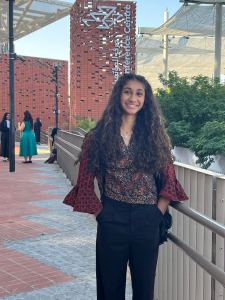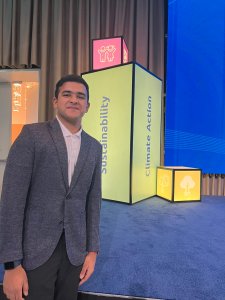Press Release for Report” Fostering Youth-led Innovations to Accelerate Progress on the United Nations Sustainable Development Goals”.
In preparation for COP28, more than 15 universities in Mexico, the United States, and Canada have combined forces to find innovative ways to Foster Youth-Led Innovation for the SDGs.
The Sustainable Development Solutions Network and the Center for Sustainable Development, Climate School, Columbia University lead this group. The group held workshops and six webinars from June to October, covering topics such as sustainability curriculum design, scaling and commercializing sustainable ventures, climate communications, and much more. Professor Wen-wen Tung of Purdue University states the importance of holistic learning referred to by the numerous webinars, ‘Today’s youth are crucial in creating a sustainable future, one that integrates innovations in the physical, digital, and holistic human realms. Institutions across all sectors must recognize youth as key assets and partners.”
At COP28, the consortium of universities led by the Center for Sustainable Development, Columbia University and University of Waterloo Canada will be releasing their report “Fostering Youth-led Innovations to Accelerate Progress on the United Nations Sustainable Development Goals”. The report features many young voices to hear from them on their needs on Eco innovations. The report has been endorsed by former Secretary General Ban Ki Moon who has stated that youth should be prepared to “…address the most pressing global challenges, education must equip all learners with the values, skills, and knowledge that nurture cooperation, resilience, respect for diversity, gender justice, and human rights.” H.E. Ban Ki-moon is also the Chair of Mission 4.7 along with Additional Secretary General UNESCO Stefania Giannini and Professor Jeffrey Sachs of Columbia University. Dr. Sumie Song of The GREEN Program and content director of the report notes, “every student, regardless of academic major, has the right to learn about sustainability and climate action. It is vitally important that young people in communities that have suffered the most harm from climate change are equipped and empowered to lead the transformation to a sustainable future”.
The consortium of universities is all set to launch their report at the RewirEd Summit “Connecting the dots: Youth-led Initiatives in Rewiring Education for Climate Action” on December 8th. The panelists including young environmental leaders such as Vidya Bindal and Eshaan Jain from New Jersey will be showcasing their grassroots actions and reflecting on the report. The panel also includes Dr. Wen-Wen Tung, Associate Professor and Director of Geodata Science for Professionals MS Program, Purdue University who is one of the co-authors of the report and The Rev. Canon Dr. Betsee Parker, Baroness of Locheil who is a supporter of Mission 4.7. Professor Matthew Witenstein from University of Dayton states that “COP28 will be a great venue to showcase young voices through our policy document”.
According to Professor Wendy Purcell of Rutgers University, “Youth are leaders now and for tomorrow and we must transform education to enable them to make their fullest contribution to the innovation necessary to deliver global betterment for all – this report highlights actionable steps for policy makers to make this happen.” Professor Purcell brings in her health and climate perspective giving it a holistic perspective. Dr. Radhika Iyengar who has spearheaded this report informs that the release of this report is timely at COP28 as it aims to foster youth leadership, innovation, and entrepreneurial capabilities through transformative approaches to sustainability education and training. The objective of the round table discussion is to galvanize more universities in the Global North–in particular from the United States, Mexico and Canada–to join this movement on teaching about the SDGs through an empowering and innovative lens. Nicholas Palaschuk of University of Waterloo and the initiator of the report writing process says that, “with the 2030 deadline right around the corner, broadening mentorship opportunities for young people to gain practical know-how is critical so they develop the confidence needed to drive sustainable solutions at scale. When youth are given the chance to apply their ideas, learn by doing, and receive proper guidance, they start to bridge their values with bold actions that create real impact.”
Beyond COP298, the consortium of universities will have an open invitation for University leaders to join workshops and webinars on Beyond Green Jobs
Read the full report here https://www.academia.edu/110132163/Fostering_Youth_led_Innovations_to_Accelerate_Progress_on_the_United_Nations_Sustainable_Development_Goals_A_Guide_for_Policy_makers
Download the paper using the follow QR Code:


